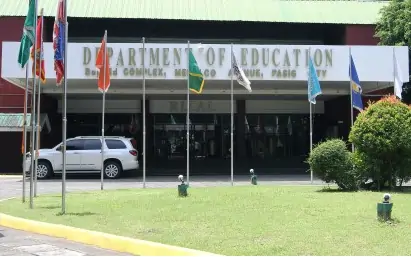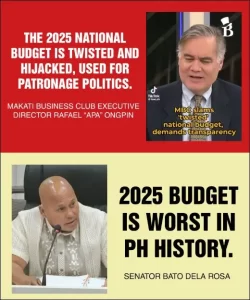
Table of Contents
DepEd: Philippine Congress Discuss 2025 Budget
As the Philippine Congress embarked on its deliberations on the proposed 2025 national budget in August, the focus has been on ensuring sustained economic growth while addressing key challenges. With the nation showing economic resilience under President Ferdinand Marcos Jr.’s administration, the upcoming budget will play a pivotal role in shaping the country’s trajectory for 2025 and beyond.
Overview of the 2025 National Budget Proposal
The proposed 2025 national budget, presented by the Department of Budget and Management (DBM), amounts to PHP 6.4 trillion ($113 billion). This represents a 10 percent increase from the 2024 budget of PHP 5.8 trillion ($102.6 billion), reflecting the administration’s ambition to maintain fiscal discipline while meeting the needs of a growing population.
Known as the National Expenditure Program, the budget proposal outlines strategic allocations aimed at addressing national priorities, promoting inclusive growth, and ensuring resilience against global economic uncertainties.
Economic Resilience and Challenges
The Philippine economy has demonstrated remarkable stability as it recovers from the global pandemic. However, inflationary pressures and global economic headwinds remain significant concerns.
These challenges underscore the importance of the 2025 budget in safeguarding the country’s economic gains while implementing measures to alleviate inflation’s impact on households and businesses.
Sectoral Budget Allocation Highlights
The DBM has strategically distributed the proposed PHP 6.4 trillion budget across key sectors:
- Social Services: PHP 2.1 trillion ($37.7 billion), representing 33.4 percent, is allocated to enhance education, healthcare, and social welfare programs.
- Economic Services: PHP 1.9 trillion ($33 billion), or 29.2 percent, will fund projects aimed at boosting infrastructure, agriculture, and trade.
- General Public Services: PHP 1.1 trillion ($19.3 billion), or 17.1 percent, is dedicated to improving government operations.
- Defense: PHP 419.3 billion ($7.5 billion), or 6.6 percent, ensures national security and modernization of defense capabilities.
- Debt Servicing: PHP 876.7 billion ($15.6 billion), or 13.8 percent, is earmarked to address the country’s financial obligations.
Priorities for Education and Infrastructure
Education continues to be the highest priority, receiving PHP 977.6 billion ($17.4 billion). This increase of PHP 8.7 billion from the 2024 budget will support initiatives in basic education, teacher training, and facility improvement. Public works follow closely, with an allocation of PHP 900 billion ($16 billion), funding critical infrastructure projects such as roads, bridges, and flood control systems.
These investments aim to enhance the nation’s human capital and physical infrastructure, aligning with the government’s vision for sustainable development.
Growth Opportunities for Businesses
The government’s budget priorities present significant opportunities for private sector growth in 2025. Businesses are encouraged to align their strategies with the administration’s focus areas, including education, infrastructure, and economic services. Public-private partnerships (PPPs) and collaborations can drive innovation and unlock new revenue streams for companies.
Conclusion: Philippine Congress Discuss 2025 Budget
The proposed 2025 national budget underscores the Philippine government’s commitment to fostering economic growth, enhancing social services, and addressing pressing national challenges. With PHP 6.4 trillion allocated across key sectors, the budget aims to sustain the country’s upward momentum while mitigating risks such as inflation and global economic uncertainties.
Education and infrastructure remain at the forefront, with increased investments in human capital development and public works projects. These priorities align with the government’s broader goals of creating more quality jobs, improving competitiveness, and strengthening national security.
For businesses, the budget presents substantial opportunities to collaborate with the government, particularly in areas like public infrastructure, education, and technology. By aligning their strategies with the administration’s focus areas, companies can contribute to national development while expanding their market presence.
Ultimately, the success of the 2025 budget will hinge on effective implementation and collaboration among stakeholders. With a clear vision and strategic allocation of resources, the Philippines is well-positioned to achieve sustainable and inclusive growth for its people.
FAQs
1. What is the total proposed of Philippine Congress Discuss 2025 Budget?
The proposed budget is PHP 6.4 trillion ($113 billion), a 10 percent increase from 2024.
2. Which sectors receive the largest allocations?
Social services and economic services receive the highest shares, at PHP 2.1 trillion and PHP 1.9 trillion, respectively.
3. How can businesses benefit from the Philippine Congress Discuss 2025 Budget?
Companies can explore opportunities in education, infrastructure, and PPPs, aligning with government priorities to drive mutual growth.
Disclaimer
The information provided in this article is for general informational purposes only and reflects details available at the time of writing. While every effort has been made to ensure accuracy, budget allocations and priorities are subject to change based on ongoing deliberations and unforeseen circumstances.
Readers are encouraged to refer to official government sources for the most up-to-date information. This content is not intended as financial or investment advice but as a resource to help you stay informed about national developments.
TechWirings does not endorse or explicitly support any views or actions expressed in this content.











